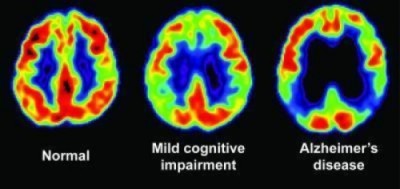Cognitive Decline – is it just a case of use it or lose it?
What are you most afraid of? Fear is a common trait which connects us all, yet it’s considered that there are only five real types of fear. And our fears normally evolve during our lifetime - from being scared of the dark or the monster under the bed as a child, to worries about careers or relationships as we get older. Or even more frightening, the prospect of Donald Trump as President... But one common fear that society now seems to share is the fear of cognitive decline, according to recent research.

Credit: Getty
Most of us have experienced ‘senior moments’, be it forgetting that you put dinner in the oven until it’s too late, or the frustration of forgetting the reason we went upstairs to do something, only to remember once we’ve ventured back down again. But the idea of these becoming the norm, rather than an occasional lapse, is a real concern.
Perhaps the biggest reason to fear either ourselves or loved ones suffering from dementia is quite simple... although amazing work is currently being undertaken, such as the recent development of a new type of PET scan which can detect amyloids in real time, helping to better understand the disease and where to target treatment, and the positive recent pre-clinical research which indicates that an approved anti-cancer drug could be used as a ‘neurostatin’ to reduce the risk of Alzheimer’s, at present there is no cure.

Red areas indicate high activity, black areas indicate no activity.
Currently the degenerative disease plagues over 850,000 people in the UK alone. And whilst some people are genetically predisposed to suffering from dementia, it could still affect any one of us. However, the good news at least is that there are a number of things which we can all do that have been shown can help protect our cognitive vitality and reduce the risk of cognitive ageing.
Exercise regularly
Whilst it is common knowledge that exercise is essential for maintaining physical health, it is often overlooked that it has an incredibly positive effect on cognitive health also! Aerobic exercise, particularly amongst older adults, has been proven to release hormones which improve memory function and cognition. Endurance exercise also produces a molecule called irisin, which is believed to have neuroprotective effects, protecting the brain from ageing.
There has also been suggestions that exercise actually changes the way that a senior brain processes information, creating a reorganization of the neural network to compensate for an ageing neural system.

Image courtesy of Huffington Post
And you don’t have to go to Eddie Izzard extremes of exercise to benefit either. A study into the positive effects of exercise by the University of British Columbia involved the participants walking briskly for one hour, twice a week, providing a marked boost to the size of the hippocampus, the area of the brain involved in verbal memory and learning. If you break this down to shorter daily activities, this is quite easily achievable and you could find that it's actually fun!
Healthy Diet
Regular exercise and a healthy diet should really go hand in hand. But maintaining a healthy diet can also help maintain a healthy brain. For a start, it helps to keep your weight in check and keep your heart healthy. And what’s good for your heart is proven to be good for the brain – high blood pressure, high cholesterol and diabetes are all linked to poor brain health later in life and increase the risk of dementia. It is therefore recommended to try to keep check of your health on a regular basis and not take these things for granted.
Whilst no specific diet has been proven to maintain or improve brain health, studies of Mediterranean style diets, typically involving green leafy vegetables, oily fish & nuts with low saturated fats, have shown that this healthy, balanced diet of whole foods rich in vitamins, nutrients and DHA omega-3 fatty acids is one of the healthiest eating regimes and may also protect the brain.
Excessive alcohol consumption has been shown to be clearly bad for the brain, so restricting intake to less than two drinks a day may be protective.
Stay socially and intellectually active
Whilst quizzes, puzzles and brain training games are fun and certainly test the brain, there are conflicting opinions on how beneficial these are to cognitive health. There has been some research which suggests that cognitive training can have long term benefits.

Credit: Shutterstock
However creatively stimulating activities such as playing an instrument, which is proven to actually increase brain volume and connectivity, or simply reading books and writing letters or messages appear to have more proven benefits to maintaining brain function.

Socially & mentally stimulating activities are shown to improve memory and cognition.
The risk of developing Alzheimer’s also doubles among people experiencing regular loneliness.
One study suggests that leisurely activities which involve physical, mental and social stimulation together help the most to prevent dementia.
It is therefore important to keep an open mind and an open heart to new experiences, maybe enrol in a course or join the University of the Third Age, or perhaps try your hand at volunteering with a local community group. Maybe explore your creative side by trying your hand at painting or other crafts. Or take in some new cultures and experiences by travelling to a different country.
We should also try to engage socially with friends & family, even if it’s just through regular conversations due to constraints of time or distance.
Staying socially and physically active can also have positive health effects, such as reducing stress and improving quality of sleep, both of which have enormous impacts on cognitive health. Neuroscientists at the University of California, Berkeley, found that chronic stress triggers long-term changes in brain structure and function, which can lead to cognitive decline. And a study by the University of California, San Francisco found an association between poor sleep quality and reduced gray matter volume in the brain’s frontal lobe, which helps control important processes such as working memory and executive function.
We should therefore be mindful of getting the right amount of sleep every day and not letting it become an afterthought. And by adding some time into our routine to de-stress regularly, maybe through practicing yoga or mindfulness meditation, has been proven to have enormous health benefits.

Taking time to de-stress can have huge long term benefits
Sentab influencing change
The Sentab system was developed to promote healthy living, social interaction and independent living. Many aspects of the system are actively designed to help maintain cognitive health, with fun & challenging games, social introductions and easy, free video calling. We are also working on home exercise and educational content to stimulate both the body & mind, together with feature packed interest groups to learn and socialise with like-minded people. Throw in our development plans which include state of the art health monitoring and doctor on demand facilities, and you have a complete system to keep you happy & healthy, all through the big screen.

The positive impact of Sentab has been recognised by the EU Horizon 2020 project, who have provided backing which is enabling Sentab to become a reality and benefit everyone, regardless of technical abilities.
If you have any other tips on avoiding cognitive decline, we'd love to hear from you in the comments below.